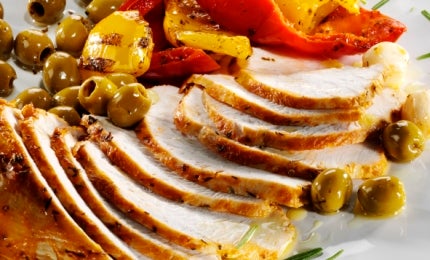Potato Starch for Meat Products

Potato starch is the ‘standard’ because of its low gelatinization temperature, fast swelling, excellent viscosity, high water binding capacity and its bland flavour and taste. When heated at around 70ºC potato starch granules absorb already large amounts of water and provide functionality in the same temperature range as meat proteins. It is thus the only starch that doesn’t require big changes in processing conditions in cooked meat products. Applications of potato starch in processed meats include frankfurters, bologna, wiener, hamburgers, meat balls, luncheon meat, meat loaves and ham.
Modified starches bind moisture, provide heat and shear stability, extend shelf life and improve freeze/thaw stability and texture. Depending on processing conditions and required texture or stability Emflo®, Emes® and Emden® are recommended. Kyrosan® maltodextrin types allow reduction of fat in emulsified meat products without giving in on texture and juiciness.
Potato- and pea fibres are very helpful for usage in meat applications, due to their high water and oil binding capacity. Emfibre® can reduce weight loss during heating. They can improve texture and are able to partially substitute emulsifiers, phosphates and proteins. Our fibres are non-allergenic.
Potato flakes and granules produced from fresh potatoes add functionality in several processed meats. Emflake® has high water-binding capacity in cold-processed, minced products. Emgranule® can be used in boiled and sterilized meat applications due to retarded swelling starting at higher temperature. This leads to shorter heating cycles due to a faster heat penetration at the early stage of the process and less overall energy input.
